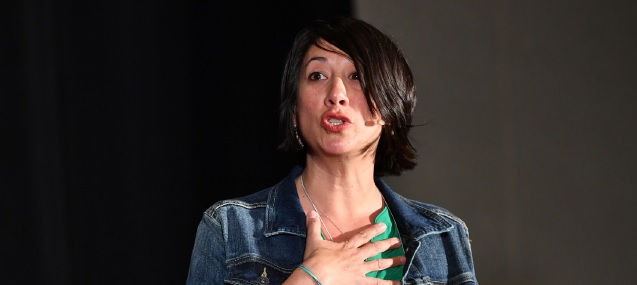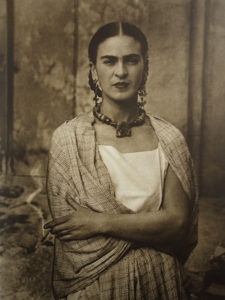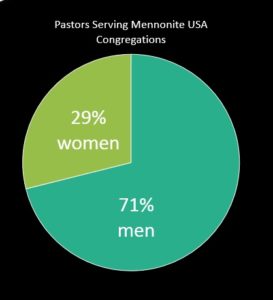
Photo by Kenneth Krehbiel.
At the Mennonite Church USA convention in Orlando in July, planners tried something new. Something they called MennoTalks. Not quite TED and not exactly Pecha Kucha, MennoTalks explored a different topic each day, featuring speakers from diverse perspectives. Topics included Celebrating Women (Wednesday); Race, Religion and Justice (Thursday); and Local and Global Peacemaking (Friday). Over the next several weeks, we’ll be featuring a series of posts based on the MennoTalk presentations in Orlando.
Jenny Castro is communications associate and coordinator of the Women in Leadership Project for Mennonite Church USA. Jenny’s MennoTalk was categorized under the topic Celebrating Women.

By Guillermo Kahlo (1871-1941) [Public domain], via Wikimedia Commons
A while back, after an annual physical fitness test at school, I encountered Frida’s long, sad frown when I collected my children at that end of the school day. She held it together until we arrived at home (but just barely).
As she stepped through our front door, my confident and creative cracker-jack girl cried, “I weigh too much!” as tears poured down her cheeks. My heart broke.
Girls and women move about in the world under incredible pressure to fulfill blatantly unrealistic ideals. We are constantly scrutinized based on our size of our bodies, our intelligence, the sound of our voice, the level of emotion we divulge, how we dress and the amount of skin we reveal. And so we’re often left second guessing: our pursuit of career, our dedication to our family, our sense of self, how we engage or relate to others. Daily we are deluged with messages from our families, from our employers, from the media, from other women and from men about how we should be in the world. What does that do to us and to our girls? Have we ever stopped to consider?
According to Heart of Leadership, a nonprofit whose programming empowers young women to be wholehearted leaders in the world, seven in 10 girls believe they are not good enough or do not measure up in some way, including their looks, performance in school and relationships with family and friends.
Bestselling author Glennon Doyle puts it this way,
“We know what the world wants from us. We know we must decide whether to stay small, quiet, and uncomplicated or allow ourselves to grow as big, loud, and complex as we were made to be. Every girl must decide whether to be true to herself or true to the world.”
Girls as young as mine and sometimes even younger already understand what society expects of them — to be sweet, to be pretty, to quiet, to be thin, to be sexy and paradoxically in our Christian culture sexually pure.
These expectations for women and girls are entangled in the fabric of our culture, our families, and our religious convictions. We teach and learn these expectations through relationships – both peer relationships — in school, at work, at church — and role models — our parents, our teachers, our pastors, our coaches, our community and global leaders, as well as pop culture icons.
And we cannot discount the influence of the media to convey cultural expectations of women (as well as men) through movies, commercials, TV, music.
And if we’ve learned anything about the media – social media and traditional media – we know that it’s loud and we know that it lies. How often have we taken time to think critically about what’s being communicated and normalized in the media?
What does the media communicate to women about beauty? That you’re never good enough. About aging? That we need to fight it at all costs. About masculinity? That a real man doesn’t cry or show emotion.
In a March 2016 article titled, Hillary Clinton, Melissa Harris-Perry and the Opposite of Imposter Syndrome, Anna Kegler unpacks our messaging to our children this way:
“Girls learn that they’ll be held to higher standards physically, intellectually, and behaviorally than boys. While boys are raised to exaggerate their skills, take risks, fall down and pick themselves back up, girls are taught to think things through and second-guess, avoid risk and failure, and not raise their hand unless they’re sure they have the right answer. Lastly, girls absorb from the media that their real value lay in their appearance, at the same time that boys absorb the message that girls are not to be trusted.”
And so this question arises: How do we as Christians respond to this reality?
I’d say that we’ve got to start with ourselves. We’ve got to begin to ask ourselves hard questions.
Where have I bought into the lie about what it means to be a woman or a man in our culture? Where are the areas that my everyday behaviors don’t match up with what I say I believe?
We’ve got to begin to recognize how much it matters what we say and do in our real-life relationships and spheres of influence, how much our behavior matters. We have to be aware of the power we hold and the messages we’re communicating when we:
- compliment a girl on how cute she looks after she nailed her science project presentation
- ask a young professional women to “tone it down” in her presentation to the board
- criticize a preacher for the tone of her voice during her sermon
- (women, this one’s specifically for us) hate and devalue our own body in front of our daughters
But personal behavioral change is only the beginning.
We are all stuck — not just women and girls, but all of us. We’re mucking around in muddy, heavy, dirty slog of patriarchy. We’ve been socialized into it, it’s been modeled, and we’ve bought into the heteronormative expectation of what it means to be a man or a woman. And we don’t even think to question it.
Patriarchy is a social structure in which men hold power and domination over all others. (Adapted from the Indigenous People’s Solidarity Movement Ottawa)
Patriarchy influences policies within our workplaces, schools and churches.
It influences our government and the laws and regulations in our country as well as how they are enforced.

Statistics pulled in May 2017. Of 778 pastors in MC USA congregations, 225 are women.
We see the fruit of patriarchy in the fact that women are still consistently paid less than men. We see it in the numbers of women compared to men in leadership in our government, workplaces and congregations. We see the fruit of patriarchy in domestic and sexualized violence. And we see it in the results of the latest presidential election.
We cannot hide from it. Instead, as followers of Jesus, we are called to be light to the world.
Matthew 5:14-16 says, “You are the light of the world. A city built on a hill cannot be hid. No one after lighting a lamp puts it under the bushel basket, but on the lampstand, and it gives light to all in the house. In the same way, let your light shine before others, so that they may see your good works and give glory to your Father in heaven.” Freedom from oppression is part of the gospel message. That freedom is not for a select few. We are to let our light shine so that all are free.
We have got to begin to recognize and name patriarchy and its influence and effect on us all. We look to Jesus as our example. Jesus, who was countercultural in his interaction with women, who taught women, who healed women, and who upon his resurrection, revealed himself first to a woman.
In Galatians Paul says: “There is no longer Jew nor Greek, there is no longer slave or free, there is no longer male and female; for all of you are one in Christ Jesus.” We are all “heirs according to the promise.”
We are all children of God and siblings in Christ. There is no hierarchy — no role to play or mold to fit. You are fearfully and wonderfully made — your body, your mind, your heart, your creativity, your strength, your vision.
You were created in God’s own image — created to reflect God to the world. This is what I told my Frida Esperanza that day, and I commit to proclaiming this freedom over and over and over again.
I pray that we each understand and embrace this truth deep in the depths of our soul. And may we have the courage to do the hard, countercultural work of transformation within our systems until all are free.

